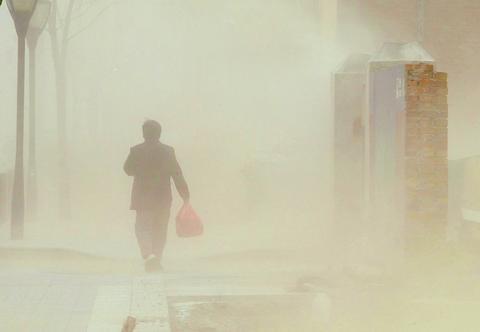Dangerous dust storms in Asia have intensified fivefold over the past half-century, posing health and economic hazards as part of global trend toward bigger natural disasters, the UN warned yesterday.
The dust storms originate in the desert regions of Mongolia and increasingly China, where 30 percent of the land is parched by over-farming, overgrazing, deforestation and changing weather patterns, the UN Environment Program (UNEP) said.

PHOTO: AP
The sands whip up as far away as the Korean Peninsula, Japan and the Pacific basin, for a combined economic loss of US$6.5 billion a year, UNEP said.
Cities like Seoul become shrouded in a haze of "yellow dust" that sometimes leaves a film of grit. In severe cases, it forces school closures and airline cancelations, can disrupt communications and damage crops and livestock.
Unlike similar storms from Africa's remote Sahara Desert, the Asian storms pose serious health risks because the dust particles pick up toxic pollutants from Chinese industry.
During a South Korean dust storm in April 2002, dust levels reached 2,070 micrograms per cubic meter, twice the level deemed hazardous to health, UNEP said.
Since the 1950s, the frequency of Asian sand storms has increased five times, UNEP said. The Gobi Desert in China alone expanded by 52,400km2 from 1994-1999, according to UNEP's GEO Global Year Book.
The new findings were released as environment ministers from around the world gathered at a UN environment summit aimed at sustainable development.
Ironically, the news comes a day after the Korea Meteorological Administration issued a dust alert for much of South Korea, urging care for those with respiratory problems.
"We are worried about the creep of environmental problems -- their disrespect of political boundaries -- and the way they threaten to compound and disrupt the functioning of major natural systems," UNEP executive director Klaus Toepfer said.
The dust storms are part of a larger trend of increasing natural disasters, UNEP said.
It cited the record heatwave in Europe that killed thousands last summer, widespread flooding in China that left millions homeless last July, the recent appearance of a hurricane in the South Atlantic for the first time and a record season of tornadoes in North America.
The cost of damage from dust storms, hurricanes, tornadoes and other weather-related catastrophes topped US$60 billion for the first time last year, according to UNEP.
About 80 percent of such disasters worldwide occur in Asia, affecting 1.7 million people and inflicting US$369 billion in damage from 1991-2001.
UNEP is working with governments and the Asian Development Bank on a US$1 million early warning system for dust and sand storms in the region. The system will use a network of monitoring stations to standardize data.
Recent research shows that dust storms originating from the Sahara Desert trigger algae infestations of coral reefs as far away as the Caribbean Sea.
Those sands pose less of a risk to human health because they are relatively cleaner than the Asian variety, UNEP spokesman Nick Nuttall said.

The Burmese junta has said that detained former leader Aung San Suu Kyi is “in good health,” a day after her son said he has received little information about the 80-year-old’s condition and fears she could die without him knowing. In an interview in Tokyo earlier this week, Kim Aris said he had not heard from his mother in years and believes she is being held incommunicado in the capital, Naypyidaw. Aung San Suu Kyi, a Nobel Peace Prize laureate, was detained after a 2021 military coup that ousted her elected civilian government and sparked a civil war. She is serving a

China yesterday held a low-key memorial ceremony for the 1937 Nanjing Massacre, with Chinese President Xi Jinping (習近平) not attending, despite a diplomatic crisis between Beijing and Tokyo over Taiwan. Beijing has raged at Tokyo since Japanese Prime Minister Sanae Takaichi last month said that a hypothetical Chinese attack on Taiwan could trigger a military response from Japan. China and Japan have long sparred over their painful history. China consistently reminds its people of the 1937 Nanjing Massacre, in which it says Japanese troops killed 300,000 people in what was then its capital. A post-World War II Allied tribunal put the death toll

‘NO AMNESTY’: Tens of thousands of people joined the rally against a bill that would slash the former president’s prison term; President Lula has said he would veto the bill Tens of thousands of Brazilians on Sunday demonstrated against a bill that advanced in Congress this week that would reduce the time former president Jair Bolsonaro spends behind bars following his sentence of more than 27 years for attempting a coup. Protests took place in the capital, Brasilia, and in other major cities across the nation, including Sao Paulo, Florianopolis, Salvador and Recife. On Copacabana’s boardwalk in Rio de Janeiro, crowds composed of left-wing voters chanted “No amnesty” and “Out with Hugo Motta,” a reference to the speaker of the lower house, which approved the bill on Wednesday last week. It is

FALLEN: The nine soldiers who were killed while carrying out combat and engineering tasks in Russia were given the title of Hero of the Democratic People’s Republic of Korea North Korean leader Kim Jong-un attended a welcoming ceremony for an army engineering unit that had returned home after carrying out duties in Russia, North Korean state media KCNA reported on Saturday. In a speech carried by KCNA, Kim praised officers and soldiers of the 528th Regiment of Engineers of the Korean People’s Army (KPA) for “heroic” conduct and “mass heroism” in fulfilling orders issued by the ruling Workers’ Party of Korea during a 120-day overseas deployment. Video footage released by North Korea showed uniformed soldiers disembarking from an aircraft, Kim hugging a soldier seated in a wheelchair, and soldiers and officials